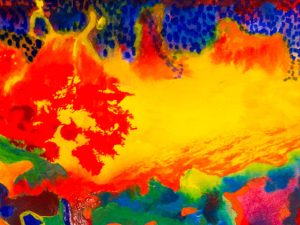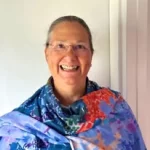
–
This quote is longer than most I share, but I think it is really worth reading because gaining objectivity over your thoughts and emotions is the first step toward mastery, freedom and healing:
‘Who am I? Who sees when I see? Who hears when I hear? Who knows that I am aware? Who am I?’
Let’s explore this question by playing a game. Make believe that you and I are having a conversation. Typically, in Western cultures, when someone comes up to you and asks, ‘Excuse me,who are you?’ you don’t admonish them for asking such a deep question. You tell them your name, for example, Sally Smith. But I’m going to challenge this response by taking out a piece of paper and writing the letters, S–a–l–l–y S–m–i–t–h, and then showing it to you. Is that who you are – a collection of letters? Is that who sees when you see? Obviously not, so you say, ‘Ok, you’re right, I’m sorry. I’m not Sally Smith. That’s just a name people call me. It’s a label.”…
But then who are you? This time you respond, ‘Okay, now you have my attention. My label is Sally Smith. I was born in 1965 in New York. I lived in Queens with my parents, Harry and Mary Jones, until I was five years old. Then we moved to New Jersey and I went to Newark Elementary School. I got all A’s in school, and in 5th grade I played Dorothy in the Wizard of Oz. I started dating in the ninth grade, and my first boyfriend was Joe. I went to Rutgers College where I met and married Frank Smith. That is who I am.’
Wait a minute, that’s a fascinating story but I didn’t ask you what happened to you since you were born. I asked you, ‘Who are you?’ You’ve just described all these experiences, but who had these experiences? Wouldn’t you still be in there, aware of your existence, even if you had gone to a different college?
So you contemplate this, and you realize that never in your life have you asked yourself that question and really meant it. Who am I? …So you ponder this more seriously and you say, ‘Okay, I am a body occupying this space. I am five foot six and weigh 135 pounds, and here I am.’
So when you were Dorothy in the fifth grade play you weren’t five foot six, you were four foot six. So which are you?Are you the four foot six person or the five foot six person? Weren’t you in there when you were Dorothy? You told me you were. Aren’t you the one who had the experience of being Dorothy in the fifth grade play and is now having the experience of trying to answer my questions? Isn’t this the same you?
Perhaps we need to step back for a moment to ask some exploratory questions before returning to the core question. When you were ten years old, didn’t you look in the mirror and see a ten year old body? Wasn’t that the same you that now sees an adult body? What you looked at has changed; but what about you, the one who is looking? Isn’t there a continuity of being? Wasn’t it the same being that looked in the mirror throughout the years? You have to contemplate this very carefully.
Here’s another question: When you go to sleep every night, do you dream? Who dreams? What does it mean to dream? You answer, ‘Well, its like a motion picture plays in my mind and I watch it.’ Who watches it? ‘I do!’ The same you who looks in the mirror? Does the same you who is reading these words also look in the mirror and watch the dreams? When you awake, you know you saw the dream. There is a continuity of conscious awareness of being… Who is having all these experiences? If you try to just give honest intuitive answers, you are simply going to say, ‘Me. It’s me. I’m in here experiencing all of this.’ And that’s about the best answer you’ll have.
It’s actually pretty easy to see that you’re not the objects you look at. It’s a classic case of subject-object. So we don’t have to go through every object in the universe and say that object is not you. We can very easily generalize by saying that if you are the one who is looking at something, then that something is not you. So right away, in one fell swoop, you know what you are not: you’re not the outside world. You’re the one who is inside looking out at that world.
That was easy. Now at least we’ve eliminated the countless things outside. But who are you? And where are you if you are not outside with all the other things? You just have to pay attention and realize that you would still be in there experiencing feelings even if all the outside objects disappeared. Imagine how much fear you would feel. You might also feel frustration, or even anger. But who would be feeling these things? Again you say,’Me!’ And that’s the right answer. The same ‘me’ experiences both the outside world and the inside emotions. … You are in there having both inner and outer experiences– but who are you?…
Where are you? Maybe we can find you in your thoughts. Rene Descartes, a great philosopher, once said, ‘I think, therefore I am.’ But is that really what is going on? The dictionary defines the verb, ‘to think’ as ‘to form thoughts, to use the mind to consider ideas and make judgements.’ The question is, who is using the mind to form thoughts and them manipulate them into ideas and judgements? Does this experiencer of thoughts exist even when the thoughts are not present? Fortunately, you don’t have to think about it. You are very aware of your presence of being, your sense of existence, without the help of thoughts. … If you are in there experiencing the peace that occurs when your thoughts stop, then obviously your existence is not dependent upon the act of thinking…
People struggle with thoughts all the time. Who is it that is aware of the thoughts, and who is it that struggles with them? Again, you have a subject-object relationship with your thoughts. You are the subject, and thoughts are just another object you can be aware of. You are not your thoughts. You are simply aware of your thoughts.
Finally you say, ‘Fine. I’m not anything in the outside world and I’m not my emotions. These outer and inner objects come and go and I experience them. Plus, I’m not the thoughts. They can be quiet or noisey, happy or sad. Thoughts are just something else I am aware of. But who am I?’
It starts to be a serious question: ‘Who am I? Who is having all these physical, emotional, and mental experiences?’ So you contemplate this question a little deeper. This is done by letting go of the experiences and noticing who is left. You will begin to notice who is experiencing the experience. Eventually, you will get to a point within yourself where you realize that you, the experiencer, have a certain quality. And that quality is awareness, consciousness, an intuitive sense of existence. You know that you’re in there. You don’t have to think about it; you just know. You can think about it if you want to , but you will know that you’re thinking about it. You exist regardless, thought or no thoughts.
To make this more experimental, let’s try a consciousness experiment. Notice with a single glance at a room, or out a window, you instantaneously see the full detail of everything that’s in front of you. You are effortlessly aware of all the objects that are within the scope of your vision, both near and far away. …Notice that you take this all in at once, without having to think about it. No thoughts are necessary; you just see it. Now try to use thoughts to isolate, label, and describe all the intricate detail of what you see. How long would it take your mental voice to describe all that detail to you, versus the instantaneous snapshot of consciousness just seeing? When you just look without creating thoughts, your consciousness is effortlessly aware of, and fully comprehends all it is.
Consciousness is the highest word you will ever utter. There is nothing higher or deeper than consciousness. Consciousness is pure awareness. But what is awareness?
Let’s try another experiment. Let’s say you are in a room looking at a group of people and pianos. Now make believe that the piano ceases to exist in your world. Would you have a major problem with that? You say, ‘No, I don’t think so. I’m not attached to pianos.’ Okay then, make believe the people in the room cease to exist. Are you still okay? Can you handle it? You say, ‘Sure, I like being alone.’ Now make believe your awareness doesn’t exist. Just turn it off. How are you doing now?
What would it be like if your awareness didn’t exist? It’s actually pretty simple–you wouldn’t be there. There would be no sense of ‘me.’ There wouldn’t be anyone in there to say, ‘Wow, I used to be in here but now I’m not.’ There would no longer be an awareness of being. And without awareness of being there is nothing. …
So now if I ask you, ‘Who are you?’ you answer, ‘I am the one who sees. From back in here somewhere, I look out, and I am aware of the events, thoughts, and emotions that pass before me.’
If you go very deep, that is where you live. You live in the seat of consciousness. A true spiritual being lives there… From that seat, you are aware that there are thoughts, emotions, and a world coming in through your senses. But now you are aware that you are aware.”
Michael A. Singer from the Untethered Soul pages 23-29
And you are objectively aware they are not you. Now I would ask, what are you going to do with that awareness?
–


1 Comment
Pingbacks
-
[…] I started this book years ago and got to what I now know is my favorite bit, and quoted it here at length on this blog. […]





